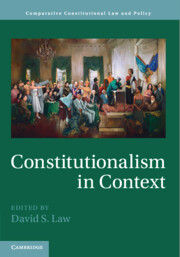Book contents
- Reviews
- Constitutionalism in Context
- Comparative Constitutional Law and Policy
- Constitutionalism in Context
- Copyright page
- Dedication
- Contents by Topic
- Contents by Region
- Figures
- Tables
- Contributors
- User’s Guide and Preface
- Abbreviations
- I Introduction to the Field
- II Concepts and Definitions
- III Constitutional Drafting and Revision
- IV Constitutional Adjudication and Interpretation
- V Rights
- 12 Social and Economic Rights: Argentina
- 13 LGBTQ Rights: Singapore
- 14 Indigenous Rights: New Zealand
- 15 Citizenship and Nationality: Cyprus
- 16 Affirmative Action: Brazil
- VI Structure
- VII Challenges to Liberal Democratic Constitutionalism
- Index
- References
16 - Affirmative Action: Brazil
from V - Rights
Published online by Cambridge University Press: 17 February 2022
- Reviews
- Constitutionalism in Context
- Comparative Constitutional Law and Policy
- Constitutionalism in Context
- Copyright page
- Dedication
- Contents by Topic
- Contents by Region
- Figures
- Tables
- Contributors
- User’s Guide and Preface
- Abbreviations
- I Introduction to the Field
- II Concepts and Definitions
- III Constitutional Drafting and Revision
- IV Constitutional Adjudication and Interpretation
- V Rights
- 12 Social and Economic Rights: Argentina
- 13 LGBTQ Rights: Singapore
- 14 Indigenous Rights: New Zealand
- 15 Citizenship and Nationality: Cyprus
- 16 Affirmative Action: Brazil
- VI Structure
- VII Challenges to Liberal Democratic Constitutionalism
- Index
- References
Summary
Measures that address racial and ethnic inequalities have been an important subject of legal and political discussion in many countries over the last decades. The legal questions include the meanings and purposes of equality, adequate methods of legal interpretation, and the possible role of constitutional courts in promoting social transformation. Participants in this debate also raise issues such as the role of the state in a democracy, the changing nature of racism, the social meanings of race and its correlation with national identity. This broad range of questions reveals the immense relevance of this topic for comparative analysis. An adequate understanding of this complex subject requires an examination of how law and race interact in different jurisdictions to produce and legitimate particular social arrangements. This is the case of Brazil, a country that implemented large scale affirmative action policies in the last fifteen years, a process that generated an intense debate about the social importance of race in a country that has historically represented itself as a racial democracy.
Keywords
- Type
- Chapter
- Information
- Constitutionalism in Context , pp. 351 - 374Publisher: Cambridge University PressPrint publication year: 2022

